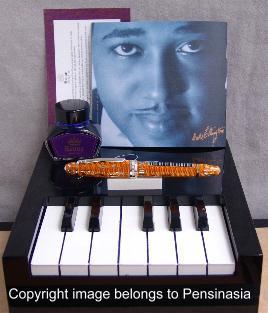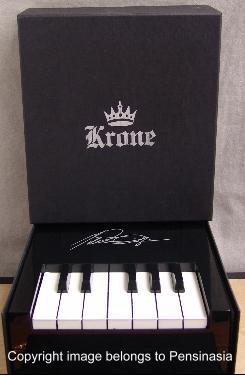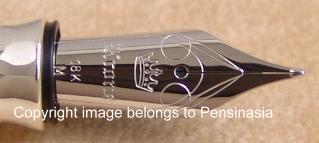|



KRONE
LIMITED EDITION
DUKE
ELLINGTON
FOUNTAIN PEN
"Krone
- The Duke Ellington Pen"
“If jazz means anything it is freedom of expression.” -Duke Ellington
Jazz may have meant freedom of expression to the young Duke Ellington, but
in the early 1920s it was a controversial art form that portended social
change and scared many middle class Americans, both black and white. The
decade that became known as the “Roaring Twenties” became a
battleground for modern ideas and established social convention. Moralists
of the era drew a close link between jazz music, public dancing,
profanity, promiscuous sex and
substance abuse. Nothing short of the decline and fall of western
civilization was being linked to jazz music. This fear was exacerbated by
the popularity of such black-influenced dances as The Charleston, which
became a national craze between 1923 and 1926. So while jazz and public
dancing were viewed as decadent, they were also fun and alluring.
Duke Ellington stood at the nexus of this controversy when he arrived in
Harlem in the early 1920s and became an integral part of the artistic
revolution known as the “Harlem Renaissance”. By the middle of the
decade Ellington had a nicely evolving sound and had developed his chops
playing the piano at all-night “rent parties”. He then got two big
career breaks in rapid succession. In the fall of 1926 he met Irving
Mills, an innovative New York music publisher who was scouting talent when
he saw Ellington at the Club Kentucky. Mills started recording
Ellington’s orchestra immediately and brought wide exposure to his music
through recordings, radio play and movies. The second break came a year
later, when the renowned Harlem Cotton Club was looking for a new house
band. Ellington auditioned for
the job and started what would become a 38 month engagement at the club,
between 1927 and 1931. During this time Ellington composed a lot of new
music and became a public figure, all the while playing six to seven
nights a week at a club run by bootlegging white gangsters. But the work
was steady and the pay was good, which provided a perfect
laboratory for Ellington to develop his sound more fully.
In the late 1930s Ellington met the man who would become his main
collaborator and musical soul mate, Billy Strayhorn. Strayhorn had
approached the bandleader after a performance in Pittsburgh and shown him
some work. Ellington was so impressed that he brought Strayhorn to New
York two months later to be his lyricist. Strayhorn’s classical training
allowed him to fully assimilate and master what he later called the
“Ellington Effect” and the two men produced a string of classic jazz
recordings in the early 1940s that included Duke Ellington’s signature
song, “Take the ‘A’ Train”, which was also viewed as Strayhorn’s
breakthrough composition.
As Duke Ellington evolved from controversial jazz innovator to bonafide
musical genius to cultural icon, he found himself at Richard Nixon’s
White House in 1969 to celebrate his 70th birthday. Nixon aide Leonard
Garment, later a key figure in the Watergate scandal, was a former
clarinetist in Woody Herman’s band, and had arranged for Ellington’s
party at the White House. In a building where most black people had
historically entered through the servants’ quarters,
including Ellington’s own father, Duke Ellington received the
Presidential Medal of Freedom, the nation’s highest civilian honor.
After the Nixons went to bed there was a jam session and dancing until
2am. In a night fraught with emotion and irony, Duke Ellington remained a
jazzman to the end.
The Krone Duke Ellington pen is fashioned from .925 solid sterling silver
and then lacquered in a lustrous orange finish. Encircling the barrel is
Duke Ellington’s signature along with his cherished vehicle of
expression, the piano. The notes from his most well know creation, “Take
The A Train" also adorn this masterpiece.











18K Solid Gold Nib

Filling Mechanism
Pen is
new
The
fountain pen is new and has never been used, neither dipped nor inked. 18k solid gold nib. Comes
with the box and paper as shown above.
|
